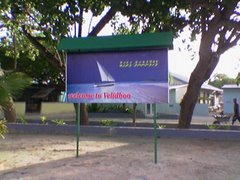Courtesy: Reuters
NAUDERO, Pakistan (Reuters) - Sounds of grief filled the dusty air of a southern Pakistani village on Friday as more than 100,000 people attended the funeral of slain former prime minister Benazir Bhutto.
Her husband, Asif Ali Zardari, wept as he accompanied the closed coffin on the 7-km (4-mile) journey to the family mausoleum at Garhi Khuda Bakhsh, a village set among paddy fields in the southern province of Sindh.
The two-time premier was gunned down by an assassin who then blew himself up in an attack that killed a total of 16 people at the end of an election campaign rally in Rawalpindi on Thursday.
Zardari appealed to the crowd massed outside the family home to give pall bearers room to slide the casket, draped with the green, red and black tricolor of Bhutto's Pakistan People's Party, into the back of the ambulance.
Bhutto's son Bilawal, 19, and daughters Bakhtawar, 17 and Aseefa, 14, prayed with their father at the tomb.
Their grief was shared by millions of poor Pakistanis, particularly in the rural hinterland of Sindh, the Bhutto family's political stronghold.
"Bhutto was my sister and Bhutto was like my mother," cried Imam Baksh, a farmer, among the throng lining the road. "With her death, the world has ended for us."
Mourners sobbed, some beat their heads and chests, and others vented anger with the government of President Pervez Musharraf, as Bhutto's husband and son lowered her body into the grave.Even political foes were shocked by the death of a woman many had criticized as a feudal leader who cultivated populist appeal while enjoying the riches of the family dynasty.
Bhutto, 54, had returned to Pakistan in October from more than eight years of self-imposed exile after reaching an understanding with President Pervez Musharraf, in power since a military coup in 1999.
Days after surviving a suicide attack on her homecoming parade in Karachi on October 19 that killed at least 139, Bhutto visited Garhi Khuda Bakhsh to pray at the tomb of her father, buried there after being overthrown and hanged three decades ago.
Zulfikar Ali Bhutto, Pakistan's first popularly elected prime minister, lies alongside his sons Murtaza and Shahnawaz in the white-domed mausoleum Benazir Bhutto ordered to be built.
Many had speculated that Bhutto and Musharraf, who quit the army last month to become a civilian president, could have ended up sharing power after a January 8 parliamentary election.
Bhutto, whose return to Pakistan was encouraged by the United States, had spoken out strongly against Islamist violence and had been threatened by pro-Taliban militants.
Educated at Harvard and Oxford, Bhutto was an articulate champion of democracy, although enemies say she was corrupt.
Islamist militants linked to al Qaeda are among the suspects, but many of her supporters blamed Musharraf and the United States for her death.
Chants of "Shame on the killer Musharraf, shame on the killer U.S." were heard from the throng lining the road and standing on rooftops.Some protesters chanted defiance: "No matter how many Bhuttos you will kill, a Bhutto will emerge from each house."
Ordinary Pakistanis are filled with cynicism concerning the military intelligence agencies, even though Musharraf himself has been targeted by al Qaeda assassins.
"Agencies have killed Bhutto," said Ali Mohammad, an aged party supporter. "If it was the work of al Qaeda why is Musharraf still surviving?"


No comments:
Post a Comment